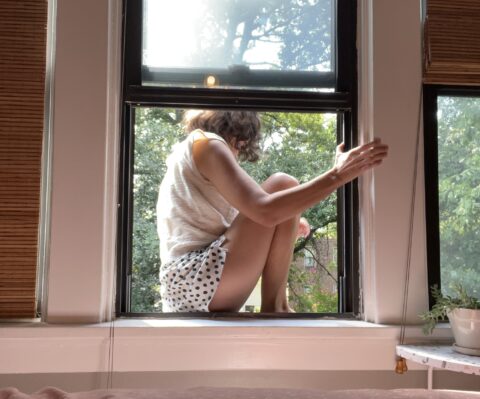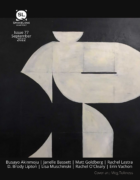Your story comments on power and lack of power. The first paragraph refers to the kind of power folk music aspired to in the sixties; at the same time, the narrator’s mother’s song implores the listener to “Stop your push for power.” The mother is trying to gain agency in the relationship, while the father “prove[s] a bigger point about their power dynamic” by leaving his pregnant girlfriend. Can you talk a little about your ideas about power, music, and their relationship?
I guess I’m interested in power as a commodity you’re born with versus something you can gain, as an internal force you can strengthen on your own versus the more external power that needs to be fostered collectively. Music has this ability to pump up so many different kinds of power in a listener. It’s a kind of drug, altering the hell out of our states.
I’m remembering the teenage snowboarders I watched in the Olympics, how they stood at the top of the hill blasting music into their headphones, helping them remember their potential and their power until the very moment they had to head down.
I think, too, that singing an idea or a feeling is much more vulnerable than speaking it, and yet somehow it’s also more powerful. I suppose there’s a solid definition for vulnerability in there somewhere.
And the fact that new ideas seem more possible with a drum beat behind them reminds us that we are really such simple little creatures. So cute.
There’s a layer of acerbic humor in the story, such as the delightful names of the father’s parody songs, of course. Is humor often a part of your writing, and what do you see as its role?
I’d say that nearly all my writing contains humor or maybe I should say “attempted humor.” I don’t go into stories trying to make them funny—many of my premises are at least half sad—but I suppose humor is my worldview, plus my most reliable defense mechanism.
I think, too, that I have this fear of being boring. If anyone is paying any sort of attention to what I’m saying, I’d really like to keep that going, so I feel I should try to be entertaining. I’m a needy hostess, basically.
Less pathetically, I think humor is the way I am best able to get at the truth. I guess all writers have their own ways of accessing truth based on their personalities and pain tolerances, and for me, the quickest way to the heart of things is in pointing out the futile absurdity of trying to do anything or be anyone.
Puns, though, have nothing to do with truth telling. Puns are clearly a cry for attention.
I’m interested in what led you to a story about folk musicians and songs. Did you, like the narrator, grow up steeped in that genre of music? Besides “Put Your Weapons Down for Lazy Hour” (of course), what is your favorite folk song and/or musician?
I grew up steeped in music, but not necessarily in folk music. My mom and stepdad owned a country radio station and my dad sang in rock bands and made me mixed tapes.
I did listen to a ton of oldies radio as a kid, and at that time “oldies” meant the fifties through the seventies, so I was mostly exposed to the kind of folk songs that had broad, mainstream appeal. So I definitely don’t have folk cred—no one’s inviting me to Newport.
I would say that Norma Tangega’s “You’re Dead” is my favorite folk song. Her voice is a warning; the song is dark and confrontational. I feel a bit allergic to the earnestness of some folk songs, but I don’t endorse that reaction at all.
Can you talk a little about flash fiction and choosing to write it? Do you also write other genres?
I do write longer pieces, but the potency of flash has had extra appeal for me in the past few years, especially during the pandemic when my attention span shrunk and my dedicated writing time dwindled.
I like how flash can feel like a word puzzle, how getting really precise with language helps me feel like I have some tiny amount of control over my life. And since flash often has a shorter incubation period, completing one can have a release valve effect as you plug away at longer projects.
Also, I have a pretty short attention span in general lately. I think, read, speak and write in snippets. It’s snippets or nada these days.
The narrator characterizes the song as their “sibling.” If you could choose any “thing” to be your non-human sibling, what might it be, and why?
I love this question. This question is my favorite cousin.
My perfect non-human sib would be quiet but not boring, and useful but also maybe slightly pointless. So I’m going to choose a penny press machine. My ideal sibling would be cranking out souvenirs.
I was thinking about saying a tree, but a tree would always be trying to teach me life lessons through metaphor. That’s a pass, sis.



 The core workshop of SmokeLong Fitness is all in writing, so you can take part from anywhere at anytime. We are excited about creating a supportive, consistent and structured environment for flash writers to work on their craft in a community. We are thrilled and proud to say that our workshop participants have won, placed, or been listed in every major flash competition. Community works.
The core workshop of SmokeLong Fitness is all in writing, so you can take part from anywhere at anytime. We are excited about creating a supportive, consistent and structured environment for flash writers to work on their craft in a community. We are thrilled and proud to say that our workshop participants have won, placed, or been listed in every major flash competition. Community works.